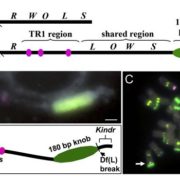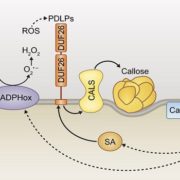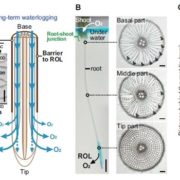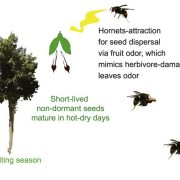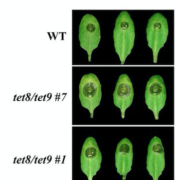Bacteria exploit autophagy for proteasome degradation and enhanced virulence in plants (Plant Cell)
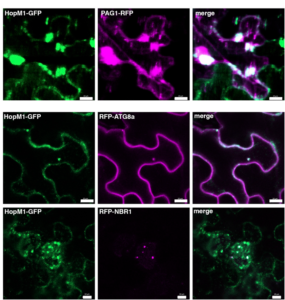 Autophagy has been defined as non-specific self-eating to obtain material that will be used for key processes within the cell. Even through authophagy has been demonstrated to be very important, its role during plant-bacteria interactions is not well known. Üstün et al. examined interactions between autophagy and the ubiquitin-proteasome system (UPS), based on previous studies showing the plant proteasome system is key to enhanced resistance against bacteria. Compromised proteasome systems are “recycled” by autophagy, therefore the authors suggested that if this process is compromised by bacterial infection, virulence is enhanced. They used pathogenic bacteria Pseudomonas syringae pv tomato DC 3000 and Arabidopsis thaliana as model systems. They found that bacterial infection enhances autophagy through bacterial effectors such as HopM1 in addition to the removal of proteasomes. However, as different effectors showed different results, they concluded that there should be different autophagy pathways that operate facilitating or limiting bacterial infections. In addition, one perspective of this work is to find more proteins that are targeted by the autophagy system in order to understand their role during pathogen infections. (Summary by Maria Julissa Ek-Ramos) The Plant Cell. 10.1105/tpc.17.00815
Autophagy has been defined as non-specific self-eating to obtain material that will be used for key processes within the cell. Even through authophagy has been demonstrated to be very important, its role during plant-bacteria interactions is not well known. Üstün et al. examined interactions between autophagy and the ubiquitin-proteasome system (UPS), based on previous studies showing the plant proteasome system is key to enhanced resistance against bacteria. Compromised proteasome systems are “recycled” by autophagy, therefore the authors suggested that if this process is compromised by bacterial infection, virulence is enhanced. They used pathogenic bacteria Pseudomonas syringae pv tomato DC 3000 and Arabidopsis thaliana as model systems. They found that bacterial infection enhances autophagy through bacterial effectors such as HopM1 in addition to the removal of proteasomes. However, as different effectors showed different results, they concluded that there should be different autophagy pathways that operate facilitating or limiting bacterial infections. In addition, one perspective of this work is to find more proteins that are targeted by the autophagy system in order to understand their role during pathogen infections. (Summary by Maria Julissa Ek-Ramos) The Plant Cell. 10.1105/tpc.17.00815


